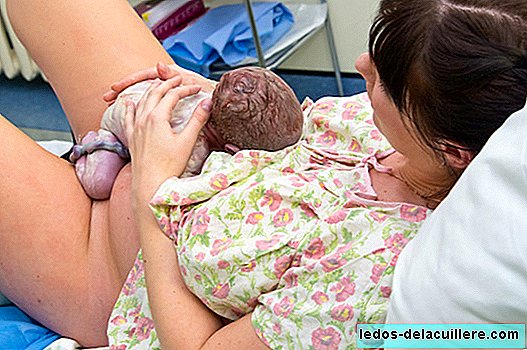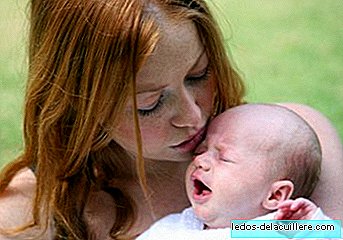After nine months gestating your baby, the time for delivery has finally arrived! A moment that many women define as one of the most beautiful of their lives, but unfortunately for others it can also be a traumatic episode.
The childcare brand Suavinex has conducted an online survey of more than 14,000 women to learn about the reality of their deliveries and develop a report on the state of childbirth in Spain, whose conclusions have been really interesting.
Childbirth as a traumatic experience
For 13% of women surveyed (approximately one in ten), the time of delivery was a traumatic experience, especially in those women under 30.

For the Birth Trauma association, there are a number of alternations that occur during childbirth and that are significant of a traumatic situation, being the most important:
- Alterations in the perception of time,
- Loss of contact with reality through trance or abstraction states,
- Expression of emotions that do not correspond to existing ones,
- Depersonalization cases (psychic state by which the person feels strange to himself, his body and the surrounding environment)
- Amnesia
In this sense, some respondents reported having gone through these moments during their delivery, and almost 2% said they had suffered amnesia.
But the time of delivery was not traumatic for all respondents, and although two out of ten evaluate him with a suspense -but without qualifying it as a trauma-, 65% approve it with a score of 3 out of 5.
Fear of childbirth
More than 57% of the participating women affirm that the moment of birth causes them fear, even when they are not first time. And is that one in ten women does not trust herself and he doesn't feel able to give birth.

For 34% of women who had already given birth at the time of participating in the study, their birth seemed a worse experience than they had in mind; being longer than expected in 40% of cases, and more painful in 34%.
- In addition, 16% said they had gone through phases of loss of control
- Almost 11% confessed to feeling helpless
- And more than 6% came to fear for their physical integrity
In 45% of respondents who had already given birth, medical complications occurred, being the most frequent:
- Fetal suffering
- Fetus position
- Non-effective contractions
- Premature delivery
- Hemorrhages
Respected Delivery
Almost 32% of respondents said they had no capacity to decide their type of delivery. But if this took place ten years or more ago, the percentage rises to almost 53%, which means that although slowly, Something is changing in the obstetric health landscape.
36% of mothers regret their birth and if they could go back they would choose to do it differently.According to the births of the respondents, 29% of cases ended in caesarean section and almost 28% were induced. In addition, episiotomies were performed in 34% of cases, instrumental deliveries were performed in almost 18%, and oxytocin was delivered to the parturient in 43%.
Only 48% of respondents said they had a natural and non-instrumental birth. That is, less than half of the women participating in the study.

Regarding the relationship with medical staff, the women surveyed point out lack of support at key moments and impersonal treatment. In addition, some say they have not felt heard by professionals and have suffered a lack of dignity and intimacy.
Postpartum and baby care
Also, newborn care and the most immediate postpartum have been analyzed in this study.

Although most mothers consider generalized prenatal care, 15% of them are insufficient. In addition, more than one 12% say that skin-to-skin contact with their baby was late and that they did not have enough information to face the first moments with their newborn.
On the other hand, 35% of the participants mentioned having suffered postpartum depression, and almost 26% had mood disorders. In addition, 3% confessed to having had difficulties in emotional bonding with their baby.
Conclusions and personal experience
Reading this study, and without having participated in the survey, I feel very identified with the results.
I think that indeed the reality of childbirth in Spain is changing and in the last ten years there are several health professionals and hospitals that ensure a more respected and humanized delivery. But it is still insufficient.

My first cesarean, almost nine years ago, it was a traumatic experience And if I could go back in time, I would undoubtedly change many of the things that were done following an absurd medical protocol and that I know today can and should be changed.
My two subsequent experiences improved markedly, although I believe that there is still a long way to go to make the woman the owner of her birth and respect her decisions.But one of the points that deserves special attention and that, however, I think is still very "green" is the newborn care and the most immediate postpartum. I can only speak based on my experience or close experiences, but it gives me the feeling that skin-to-skin contact, help with breastfeeding and physical and psychological attention to the recent mother are still a mirage in most hospitals
I confess that I am very sorry that one in ten women consider their birth as a traumatic experience. I myself felt this way after my first caesarean section, and although the experience helped me to mature and know what I wanted in the future, it is a feeling that always accompanies you and makes you remember with shadows one of the most beautiful moments of your lifetime.
And you, How did you live your delivery and postpartum? Do you see yourself reflected in this survey?
In Babies and More 'Exposing the silence', a photographic project that gives voice to mothers with traumatic birth experiences, will everything go well? The most common fears of the pregnant woman, Why should a woman not go to give birth with fear, Do you prefer a birth without epidural and shorter or a birth with epidural and longer ?, History of my first caesarean section. A dehumanized caesarean section












